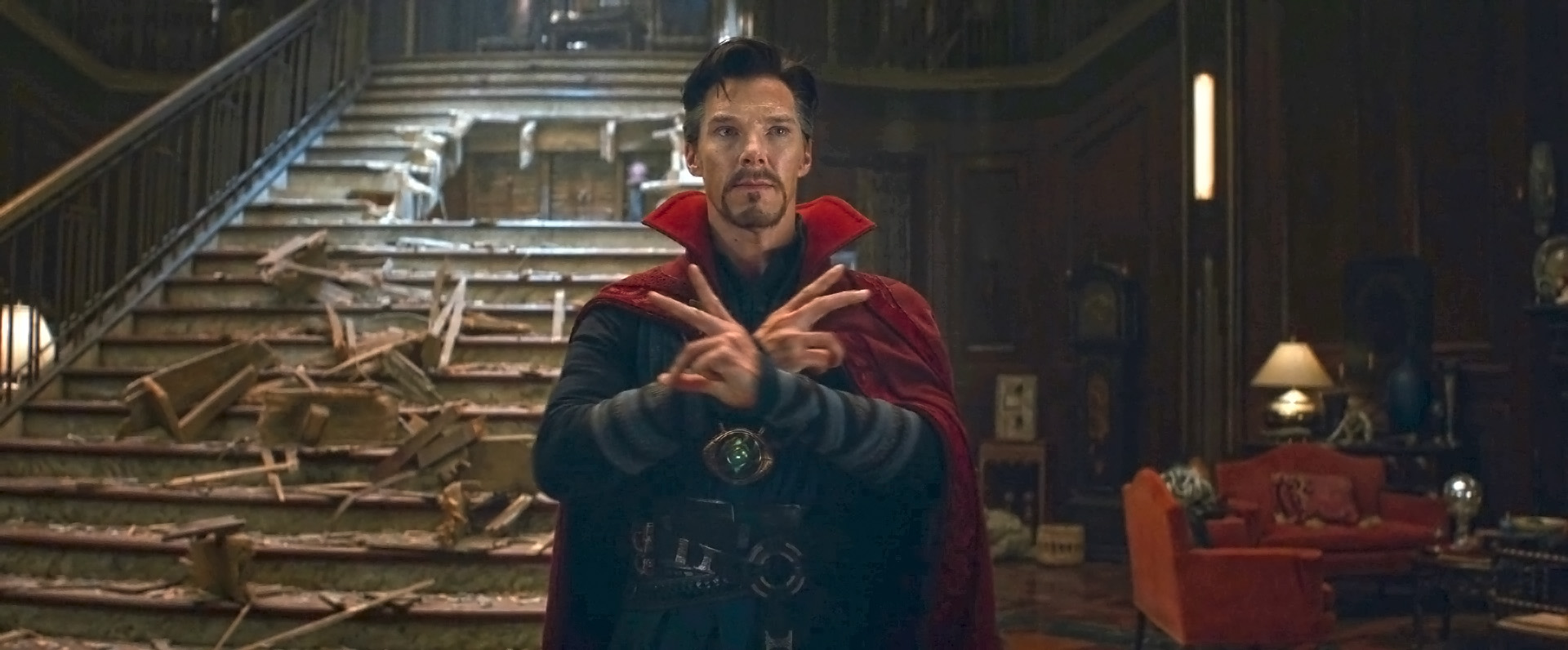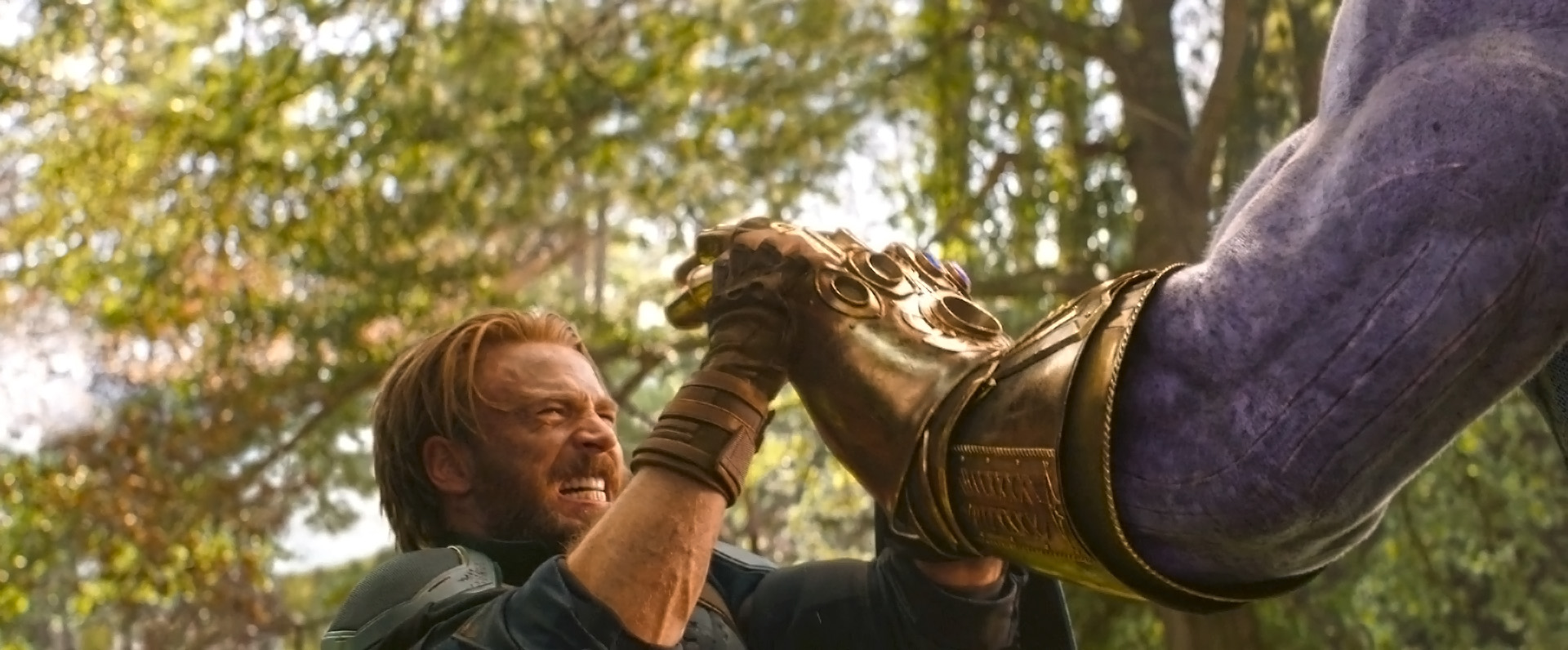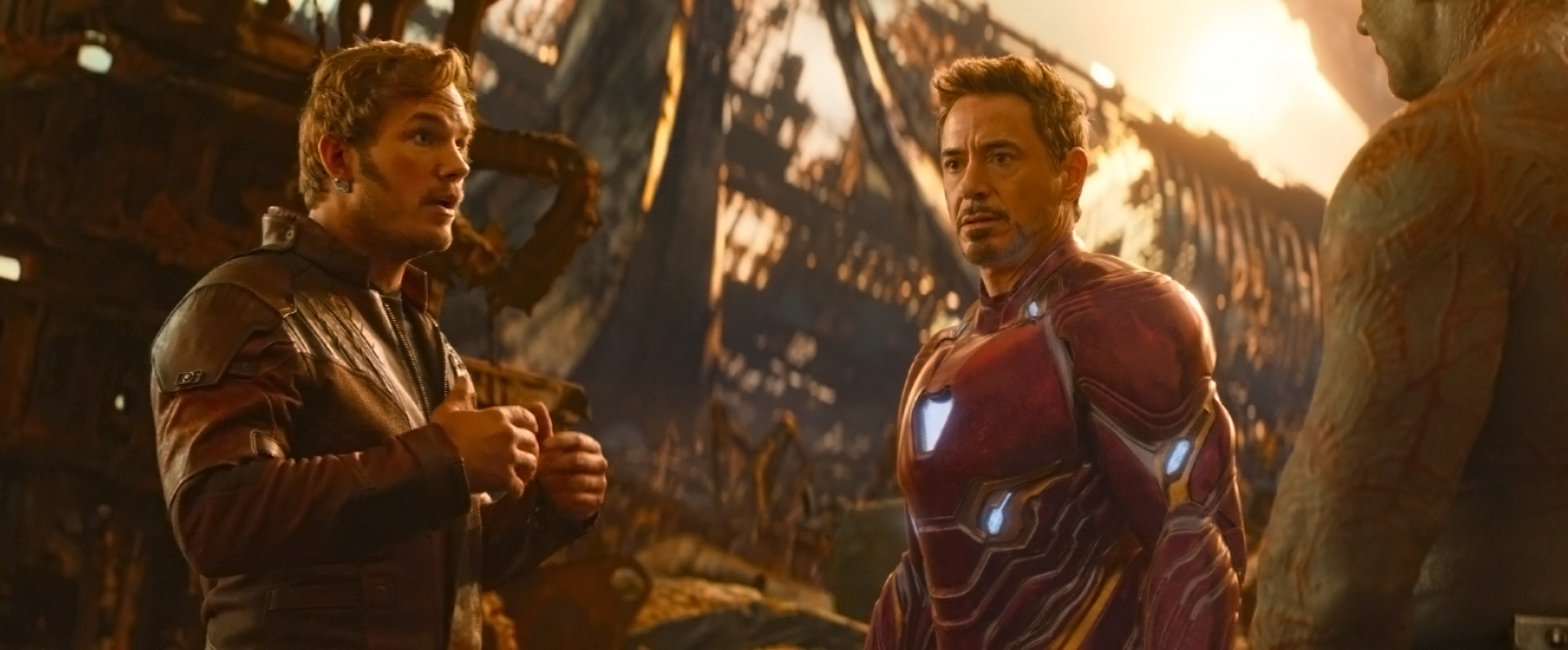Ten Years. Eighteen Movies. Six Stones. One Megalomaniac.
It was and has all been leading up to this.
The amount of hype Avengers: Infinity War seems to have amassed remains unprecedented in film’s modern-day history, rivaling perhaps only the third coming of Star Wars. As has been the lengthy serialized build-up to it over the course of a decade’s worth of storytelling. And its ambition of uniting together characters from as many as seven disparate but interconnected sub-franchises into one splash of an event remains unattempted even in an industry that has tried it all. Mammoth expectations riding on Infinity War is then a natural byproduct. After all, it’s the long-awaited pay-off, the outcome we’ve all been waiting to witness when we unwittingly and unknowingly embarked on this journey through the Marvel Cinematic Universe eons ago. The question then, should not be if the movie lives up to the hype but how much.
The sheer scale of this third Avengers movie demands storytelling of a different kind. We get an inkling of this in what amount to literally the opening seconds of the movie when the triumphant orchestral music that often accompanies the traditionally flashy Marvel Studios logo is aurally substituted by eerie distress calls being broadcast from the Asgardian wreckage out in space. You’d think that a studio would want to celebrate their ten years in the industry with a little more fanfare but contrary to popular belief, Marvel gets down to business immediately. The movie then picks off literally minutes after the mid-credits scene in Thor: Ragnarok that saw a gigantic Sanctuary II towering over what’s left of the Asgardian populace. The Mad Titan Thanos has arrived to kick-off his hunt for the Infinity Stones and as soon as he makes his appearance, you realize he has one stone already. In mere minutes then, he brings the God of Thunder Thor to his knees, fights off a raging Hulk and makes the usually devious Loki tremble. The point is clear: Thanos is unlike any other Marvel villain you’ve seen and means business.
From there, the movie barely lets you catch a breath. Before we’re able to sink it in, we’re thrust amid a massive battle in New York City that sees Strange, Wong, Stark and Spidey quickly team-up and fend off Thanos’ Black Order. The purple giant’s hunt for the Infinity Stones is practically relentless; plot developments happen quicker than you’re able to grasp and the story moves at a feverish pace, at least in the first 15-20 minutes, before it settles down a bit to delve on some character interactions and backstories. It’s clear writers Christopher Markus and Stephen McFeeley as well as directors Anthony & Joe Russo have chosen not to develop or reintroduce all the characters and instead end up surrounding a wide majority of them with the goings-on in the film. And with 2 hours 30 minutes at their disposal to wrap this vast tapestry of narratives, it’s only wise of them to stick to the main game.
 This sort of narrative frenzy would generally go against a movie but for some reason it works in Infinity War. Perhaps the large swath of movies preceding and complimenting it help plug in the gaps. In terms of plot structure then, Avengers: Infinity War plays off a lot like the finale of an ongoing TV Show season than a standalone movie that can be viewed in its own right. Characters don’t brood over their journey through lengthy monologues but are instead given brief moments to shine, small chunks of time where the few lines they utter provides a general insight into them, augmenting in broad strokes the superhero personality you’re looking at. This approach also means character arcs are largely done with for most of our heroes, save a few. Thus Steve Rogers for instance doesn’t necessarily go from mindset A to mindset B during the course of the movie but largely stays where he is as a character. Without giving away too many spoilers, the same can’t be said for everyone even though it holds true for quite many of them, making Avengers: Infinity more akin to Dunkirk than say, even the original Avengers in that it’s more concentrated on delivering a visceral experience rather peppered with vivid interactions.
This sort of narrative frenzy would generally go against a movie but for some reason it works in Infinity War. Perhaps the large swath of movies preceding and complimenting it help plug in the gaps. In terms of plot structure then, Avengers: Infinity War plays off a lot like the finale of an ongoing TV Show season than a standalone movie that can be viewed in its own right. Characters don’t brood over their journey through lengthy monologues but are instead given brief moments to shine, small chunks of time where the few lines they utter provides a general insight into them, augmenting in broad strokes the superhero personality you’re looking at. This approach also means character arcs are largely done with for most of our heroes, save a few. Thus Steve Rogers for instance doesn’t necessarily go from mindset A to mindset B during the course of the movie but largely stays where he is as a character. Without giving away too many spoilers, the same can’t be said for everyone even though it holds true for quite many of them, making Avengers: Infinity more akin to Dunkirk than say, even the original Avengers in that it’s more concentrated on delivering a visceral experience rather peppered with vivid interactions.
This different approach to character progression undertaken by this sprawling epic also means that the character that ends up getting the most screen time is the chief antagonist Thanos. While his children, colloquially designated as the Black Order remain somewhat undeveloped, with only fleeting hints into their traits and personalities sprinkled here and there, Thanos is clearly one of the most fleshed out, well-explained and dare I say at-times sympathetic antagonists to grace the screen, despite his largely genocidal intentions. His singular goal of course is to rid the universe of overpopulation by wiping out half of it, a goal as much ridiculous as relatable. That objective may seem insane when applied to the whole body of galaxies but makes a semblance of sense when localized in context of say, a city or a country. In that sense, Thanos is more reminiscent of Bertrand Zobrist from Dan Brown’s Inferno who sought to sterilize the world’s population to prevent it from consuming earth in the future. At his core then, Thanos has a somewhat rational motive which, because of its execution and extension in scale, comes across as bizarrely maniacal.
Thanos is also a creature of compassion, as is evident in his numerous interactions with Gamora, his favorite among both his daughters. The two share some of the best scenes in the movie that, when viewed in isolation, almost make this loud extravagant offering come across as an intimate father-daughter family drama. We also get a glimpse into Gamora’s past when Thanos adopted her after slaying her entire planet in his mission to rid the world of excess living beings. It evokes mixed emotions; at one end, you’re able to side with Thanos for caring for a child and yet, you’re disgusted by how he goes on slaughtering an entire planet. He has little regard for a lot of life, and yet a lot of regard for a little life. A terrible tragedy befalls their relationship and without giving anything away, the result is a heartbreaking sequence that simultaneously instills a sense of empathy and execration for the antagonist. It’s easily one of the finer scenes in some complex superhero filmmaking purely for the sense of dread and emotions it invokes in you as a spectator.
Some broad parallels can be drawn between the MCU’s most crucial mascot Tony Stark and Thanos and one has to wonder if these are intentional. Despite undertaking what essentially amounts to mass extermination of the universe’s populace, Thanos believes he’s doing the right thing, his consensus being that half the universe will still survive, even thrive on the leftover resources. Thanos has then proactively taken it upon himself to protect the universe from a threat it hasn’t even encountered yet. After the events of The Avengers and Iron Man 3, Stark similarly sought to proactively protect Earth from unforeseen threats by secretly reactivating his Ultron program and bringing an Artificial Intelligence to life, a move which brought down an entire city. Both Thanos and Stark don’t necessarily consult other people before validating their goals, blindly believing they’re doing the necessary thing while being ignorant of the consequent destruction their actions bring. Both seem to be smart, intelligent and confident in their capability of executing their plans to save the world they inhabit from future threats. Thanos in that sense, is the twisted antithesis of Stark and a dark reflection of what he could have been had he not been grounded by a strong support system of his surrounding teammates, ready to call him out when he’s wrong.
There are two other emotions Infinity War primarily makes you experience through its scripted narrative. The first of these is joy. Call it fun, euphoria or intense delight, the movie abounds in moments where it’ll incite in you a strong desire to hoot, cheer or do a fist bump. Whether it’s the introduction of the Guardians of the Galaxy, Tony Stark and Stephen Strange conversing with each other, then subsequently fighting in New York against the Black Order, each taking on Thanos by themselves or several moments in the climactic Battle of Wakanda that I won’t reveal here, Infinity War seems packed with moments that surprise you and make you a part of the event. And should you happen to experience the movie with an enthusiastic crowd, the theater truly comes alive with an almost raucous yet infectious energy unseen since The Avengers or Star Wars: The Force Awakens. There’s a particularly bad-ass moment in the said battle where all the women kicking butt in the franchise – Black Widow, Scarlet Witch and Okoye – are brought together in a face-off against the lone female among the ranks of the Black Order, Proxima Midnight and the audience squealed in delight at the sight of the trio giving it to Proxima. The Russos carefully strike a balance between fan-service and plot-service, walking a tight rope without tipping over either side. While that means we get plenty of unique combinations of character interactions, it also means we don’t get a Sherlock joke. Sorry folks.
The final emotion that Infinity War makes you experience, which you also depart the theater with for better or worse, is a sense of dread, shock and even confusion. Resisting the extreme urge to give anything away, the final few moments of the movie present an outcome rarely presented in a movie of such mainstream scale. Calling it a cliffhanger would be somewhat accurate and yet belittle what the movie achieves. That the Russos, the writers and the studio itself had the guts to pull this confounding ending off and risk leaving viewers shell-shocked in a conundrum is testament to their fierce intention to stick to their vision (pun intended). It’s a controversial ending that is bound to leave a sour taste in some people’s mouths while leaving others lauding the audacity of the move. Regardless of which way you sway, it leaves you with more questions than answers and that’s generally the kind of ending I’m all game for.
It’s beyond debating or discussing at this point but technically, Infinity War is a flawless production. Cinematographer Trent Opaloch makes fabulous use of the Arri-65 IMAX cameras and the film plays out in its 1.9:1 aspect ratio on IMAX theaters engulfing the entire screen, making Avengers: Age of Ultron with its wider aspect ratio the only anomaly in the Avengers franchise. My understanding is, Infinity War still employs the traditional 2.35:1 aspect ratio for widescreen theaters but preferably, IMAX is the way to go. The movie’s events take place on earth as well as on a cosmic scale and the multitude of planets and locations you end up journeying through implies plenty of visual richness to be experienced. It’s also evident from the trailers that editors Jeffrey Ford and Matthew Schmidt (the usual collaborators working with Russo Brothers) were hard on the material; several scenes didn’t make it to the final cut and I’d love to see a 3 hour extended edition with all deleted scenes intact and restored. Alan Silvestri returns to score after The Avengers and his signature Avengers theme plays at just the right moments to induce a sense of victorious glee, as the remnants of his score offers variations and spins on some other themes. The visual effects are seamless for Thanos and look great up close. In some of the shots though, especially when mixing and blending live-action characters with CG backgrounds, the rotoscoping seems to show and you can clearly see the softness of texture around the characters’ outlines indicating the parts that were green-screened out. It’s a minor quibble that I really spotted only for a few scenes but it doesn’t detract from the viewing experience at all.
A movie of this scale truly works because of the union of several dissimilar characters with their own distinctive personalities and dissonant egos that they embody and carry over from their previous movies. I was surprised by how much of a strong presence the Guardians of the Galaxy had and each of them stay true to their respective characters as established in their dual volumes. Back on earth, Stark and Strange lead the pack, played with hitherto perfection respectively by Robert Downey Jr. and Benedict Cumberbatch; their interactions are a joy to witness on the big screen. Stark and Parker continue to share their mentor-mentee relationship although in the limited run time allotted, they’re unable to expand upon it. Chris Evans, Chadwick Boseman, Scarlett Johansson, Sebastian Stan and Anthony Mackie basically just carry on from the previous movies without any depth to their stories in this one as Don Cheadle gets a lot more to do as War Machine compared to past appearances.
 The scene stealers in the movie are unarguably Thor and Thanos. Chris Hemsworth carries on from Taika Waititi’s re-imagining of the character as he brilliantly and rather poignantly uses humor as a coping mechanism to deal with the personally losses he’s accumulated along the way. In a heart-wrenching scene, the Russos bring out what makes the character tick despite all his tragedy when he opens up to a bewildered Rocket aboard the Guardians’ ship. In that moment, Thor truly wins you over and a few of his subsequent scenes elicited the loudest cheers from the theatrical audience. Finally, the movie is really about Thanos, his quest to bring what he believes to be balance to the universe and his relentless pursuit of the stones for which he has to sacrifice and pay quite the price. Josh Brolin kills it in his motion capture performance bringing out the humanity in a crazed maniac, and showing a sympathetic and soft side to an otherwise psychotic character. It’s a nuanced performance with some effective CGI work and is undoubtedly the highlight of the movie.
The scene stealers in the movie are unarguably Thor and Thanos. Chris Hemsworth carries on from Taika Waititi’s re-imagining of the character as he brilliantly and rather poignantly uses humor as a coping mechanism to deal with the personally losses he’s accumulated along the way. In a heart-wrenching scene, the Russos bring out what makes the character tick despite all his tragedy when he opens up to a bewildered Rocket aboard the Guardians’ ship. In that moment, Thor truly wins you over and a few of his subsequent scenes elicited the loudest cheers from the theatrical audience. Finally, the movie is really about Thanos, his quest to bring what he believes to be balance to the universe and his relentless pursuit of the stones for which he has to sacrifice and pay quite the price. Josh Brolin kills it in his motion capture performance bringing out the humanity in a crazed maniac, and showing a sympathetic and soft side to an otherwise psychotic character. It’s a nuanced performance with some effective CGI work and is undoubtedly the highlight of the movie.
Avengers: Infinity War is a comic-book nerdgasm so delightful you’ll want to experience it again and again. It’s a movie that lingers and stays with you long after you’ve left the theater. The impact of seeing these different characters from their own franchises coalesce into a unified cohesive narrative, and exchange banter with each other is something comic books have long had the privilege of, and is finally an honor movie-goers can experience as well. However, despite the claims of the studio that the movie is for everybody, it’s not. The fact of the matter is (and I cannot stress this enough), it’s incredibly important for you to have been caught up with the events of the previous movies to be able to fully appreciate the impact of this movie and the storytelling it has to offer. In that sense, this is a different kind of a movie, the emergence of a new art form in serialized storytelling, that successfully builds upon years and years of films and character development and successfully coalesces its rag-tag band of characters to deliver what it always intended to – the first of a two part climax. For by the time the movie ends, you’ll be desperate for answers you never knew you wanted. As an experiment in shared-universe storytelling then, Avengers: Infinity War offers a new kind of experience not felt in theaters before, and succeeds gloriously enough for its flaws to be overlooked and given the pink slip.
And please do yourself a favor and stay back for the post-credits sequence. It’s heavily connected to the movie and teases the introduction of yet another highly anticipated character that will ensure you leave the theater with a sense of hope.
Highly Recommended.
Overall Score: 10 out of 10.






